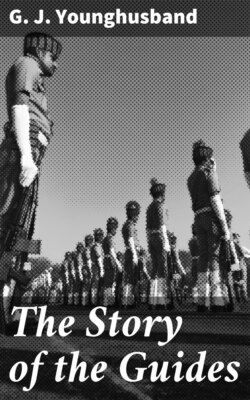Читать книгу The Story of the Guides - G. J. YOUNGHUSBAND - Страница 6
На сайте Литреса книга снята с продажи.
THE FIGHTING ROUND MOOLTAN AND AFTER
ОглавлениеThese prompt measures, however, served only a local and temporary purpose, effective but little beyond striking distance of the troops stationed at Lahore. The flame of unrest damped down here had burst forth under a different banner at Mooltan, where the Diwan Mulraj farmed the province under treaty with the Sikhs. The Diwan himself was a miserable personality, but carried away by the tide of popular feeling, he became inextricably involved in antagonism to the British cause by the cold-blooded murder of Agnew and Anderson. These two British officers, with the full consent and support of the Sikh Durbar, had been sent to Mooltan on special duty in connection with the voluntary abdication of Mulraj, which had been accepted by his suzeraine. The escort sent with the British officers was a strong one, and, if loyal, perfectly competent to deal with any disorders. It consisted of fourteen hundred Sikhs, a regiment of Gurkhas, seven hundred cavalry, and six guns.
This seemingly formidable and carefully composed body of troops proved, however, to be entirely unreliable. Agnew and Anderson were, within a few hours of their arrival at Mooltan, attacked and severely wounded by fanatics, and no one raised a hand to help them. Lying helpless and sorely wounded in the temporary asylum which their quarters afforded, they heard with dismay that practically the whole of the escort on whom their safety depended had gone over to the faction of Mulraj, a faction which insisted on his remaining in power, and which was strongly antagonistic to the claims of British political influence. Alone amid thousands, it remained only for these brave young officers to offer up their lives on the altar of British dominion.
Thus strongly committed to a line of action which was far from according with his weak and vacillating nature, Mulraj raised the standard of revolt, and sending the fiery cross through the country, called on all to join in expelling the hated foreigner, and common enemy, from the Land of the Five Rivers. The prospects of the cause looked bright indeed. No organised body of British troops lay nearer than Lahore, hundreds of miles distant; the hot season had commenced, when the movement of regular troops encounters almost insuperable difficulties; the whole country was smarting under the sense of recent severe but hardly conclusive defeat; while hundreds of petty chiefs, and thousands of soldiers, were chafing under the thinly disguised veil of foreign sovereignty.
Yet out of the unlooked for West arose a star which in a few brief weeks eclipsed the rising moon of national aspiration, and, shining bright and true, helped to guide the frail bark of British supremacy through victory to the haven of a permanent peace. That star was an unknown British subaltern named Herbert Edwardes. Edwardes was one of the young officers deputed to assist the Sikhs in the work of systemising and purifying their administration, and was at this time engaged in the revenue settlement of the Dera-Ismail-Khan district. One day in June as he sat in court settling disputes, there came to him a runner, covered with dust and sweat, who brought to him a last message from Agnew, as he lay wounded on his bed in Mooltan. The message asked urgently for help, and appealed, as the writer knew, to one who would spare no risk or pains to furnish it. To succour the wounded British officers was a matter which had passed beyond the region of possibility, for the ink had hardly dried on their message before they were murdered; but to re-establish the prestige of the British name, to reassert its dignity and influence, and to bring to punishment the perpetrators of a hideous and treacherous crime—these tasks Herbert Edwardes at once set before himself.
Alone, save for the presence of one other Englishman, the young British subaltern, with the sage intrepidity of ripest experience, hastily summoned the chiefs of the Derajat and Bannu districts to his aid, and assembled their motley followings under his banner. He sent messengers to the friendly chief of Bhawulpore, and called on him to join in the crusade against Mooltan. Then after much feinting and fencing, and greatly assisted by the stout Van Cortlandt, Edwardes threw his army across the Indus, at this season a roaring torrent three miles wide, and sought out his enemy. Coming up with him he defeated Mulraj and his army of ten thousand men in two pitched battles, and drove him to take refuge behind the walls of Mooltan.
Accompanying Herbert Edwardes was a detachment of the Guides, lent by Lumsden, and before the war bent on learning their way about this portion of the frontier, in accordance with the rôle assigned their corps. This detachment not only joined with natural zest in the hard fighting that fell to the share of all, but proved of great service to the commander as scouts and intelligence men. So far did intrepidity and love of adventure carry them, that four sowars,[1] under Duffadar Khanan Khan, rode through the enemy's outposts, and with admirable coolness picketed their horses, probably without excessive ostentation, amidst the enemy's cavalry. They then separated, and went about to see and remember that which might be useful to their own commander and their own comrades in the war. It is perhaps needless to say that discovery meant instant death, yet, with the happy insolence of the born free-lance, superb indifference carried them through where the slightest slip would have been fatal. Indeed, one of them, by name Mohaindin, with nerves of steel, actually succeeded in being taken on as an orderly by Diwan Mulraj himself, and while acting as such was severely wounded by a round shot from one of our own guns at the battle of Sadusam.
